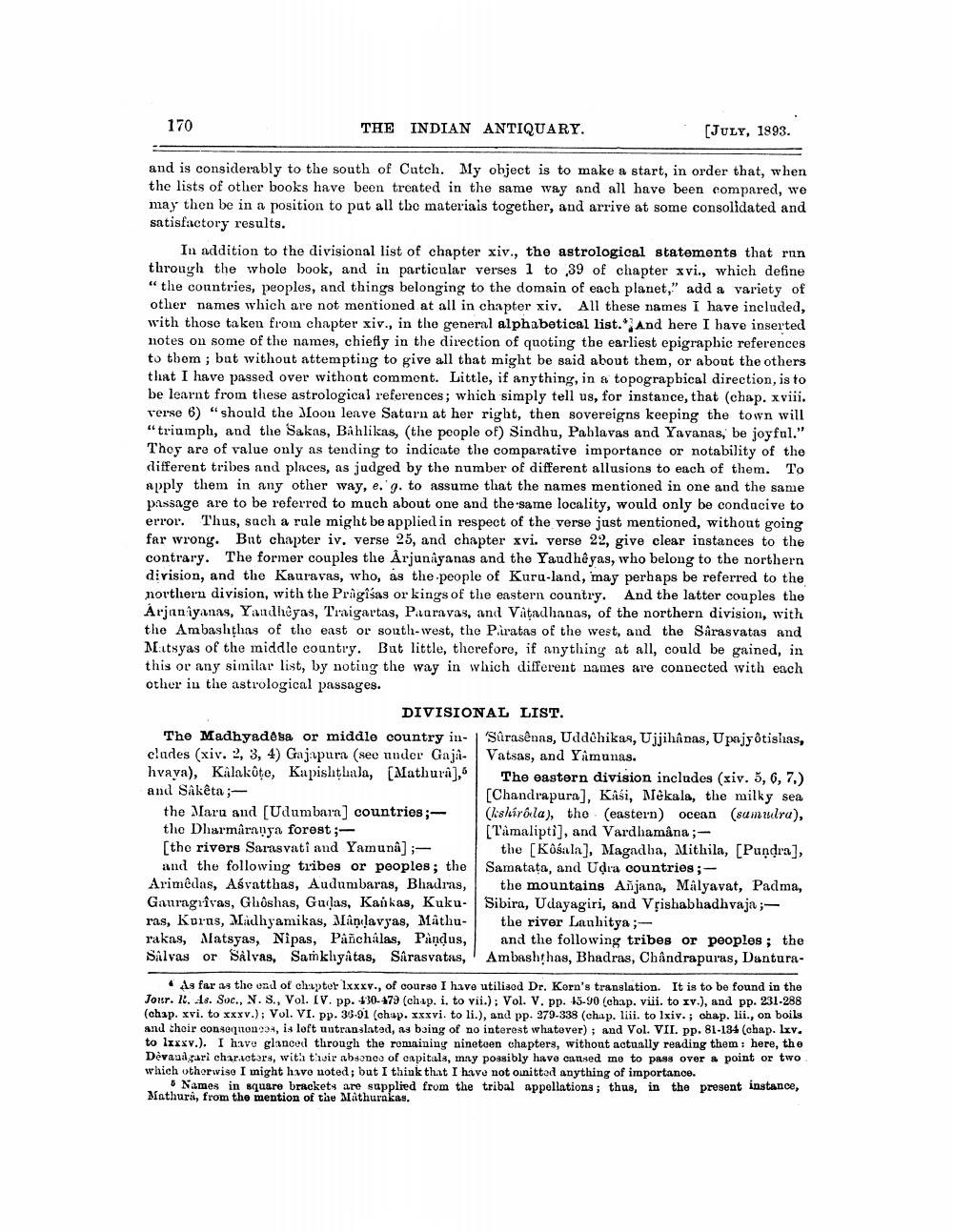________________
170
THE INDIAN ANTIQUARY.
[JULY, 1993.
and is considerably to the south of Cutch. My object is to make a start, in order that, when the lists of other books have been treated in the same way and all have been compared, we may then be in a position to put all the materiais together, and arrive at some consolidated and satisfactory results.
In addition to the divisional list of chapter xiv., the astrological statements that run through the whole book, and in particular verses 1 to 39 of chapter xvi., which define "the countries, peoples, and things belonging to the domain of each planet," add a variety of other names which are not mentioned at all in chapter xiv. All these names I have included, with those taken from chapter xiv., in the general alphabetical list. And here I have inserted notes on some of the names, chiefly in the direction of quoting the earliest epigraphic references to them; but without attempting to give all that might be said about them, or about the others that I have passed over without comment. Little, if anything, in a topographical direction, is to be learnt from these astrological references; which simply tell us, for instance, that (chap. xviii. Verse 6) “should the Moon leave Saturn at her right, then sovereigns keeping the town will "triumph, and the Sakas, Bahlikas, (the people of) Sindhu, Pahlavas and Yavanas, be joyful." They are of value only as tending to indicate the comparative importance or notability of the different tribes and places, as judged by the number of different allusions to each of them. To apply them in any other way, e. g. to assume that the names mentioned in one and the same passage are to be referred to much about one and the same locality, would only be conducive to error. Thus, such a rule might be applied in respect of the verse just mentioned, without going far wrong. But chapter iv. verse 25, and chapter xvi. verse 22, give clear instances to the contrary. The former couples the Arjunayanas and the Yaudhêyas, who belong to the northern division, and the Kauravas, who, as the people of Kuru-land, may perhaps be referred to the northern division, with the Pragišas or kings of the eastern country. And the latter couples the Arjaniyanas, Yandhyas, Traigartas, Pauravas, and Vatadhanas, of the northern division, with the Ambashthas of the east or south-west, the Paratas of the west, and the Sarasvatas and Matsyas of the middle country. But little, therefore, if anything at all, could be gained, in this or any similar list, by noting the way in which different names are connected with each other in the astrological passages.
DIVISIONAL LIST. The Madhyadosa or middle country in- Surasênas, Uddehikas, Ujjihanas, Upajyotislas, clades (xiv, 2, 3, 4) Gajapura (see under Gaja- | Vatsas, and Yamunas. hvava), Kalakote, Kapishthala, Mathura], The eastern division includes (xiv. 5, 6, 7) and Sakêta ;
[Chandrapura), Kasi, Mekala, the milky sea the Maru and [Udumbaral countries; (kishírôla), the eastern) ocean (sumulru), the Dharmiranya forest;
[Tàmalipti], and Vardhamana ;[the rivers Samsvati and Yamunâ];
the [Košaln), Magadha, Mithila, [Pundra], and the following tribes or peoples; the Samatata, and Udra countries;Arimêdas, Aśvatthas, Audumbaras, Bhadras, the mountains Añjann, Malyavat, Padma, Gauragrîvas, Ghoshas, Gulas, Kaukas, Kuku- Sibira, Udayagiri, and Vpishabhadhvaja ;ras, Korns, Madhyamikas, Manilavyas, Mathu- the river Lauhitya;rakas, Matsyas, Nipas, Panchalas, Pandus, and the following tribes or peoples; the Salvas or Sålvas, Samkhyatas, Sarasvatas, Ambashthas, Bhadras, Chandrapuras, Dantura
• As far as the end of chapter lxxxv., of course I have utilized Dr. Kern's translation. It is to be found in the Jour. 1. 18. Soc., N. S., Vol. IV. pp. 130-479 (chap. i. to vii.); Vol. V. pp. 15-90 (chap. viii. to xv.), and pp. 231.288 (chap. xvi. to xxxv.): Vol. VI. pp. 35-91 (chap. xxxvi. to li.), and pp. 279-338 (chap. liii. to lxiv. ; chap. lii., on boils and their consonon , is loft untranslated, as being of no interest whatever); and Vol. VII. pp. 81-134 (chap. lxv. to lxxxv.). I havo glanced through the remaining nineteen chapters, without actually reading them here, the Dévaailgari characters, with their absonca of capitala, may possibly have caused me to pass over a point or two which otherwiso I might have noted; but I think that I have not onittod anything of importance.
Names in square brackets are supplied from the tribal appellations ; thus, in the present instance, Mathura, from the mention of the lathurakas.




